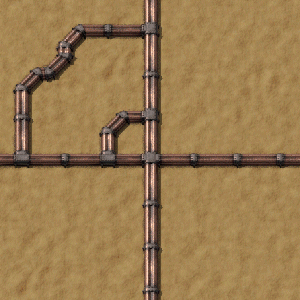Heat pipe: Difference between revisions
(Changed to reflect heat propagation changes in 0.15.11) |
(New infobox organization.) |
||
| Line 1: | Line 1: | ||
{{Languages}} | {{Languages}} | ||
{{:Heat pipe | {{:Infobox:Heat pipe}} | ||
The '''heat pipe''' can transport heat over longer distances and connect devices which produce and use heat. Currently this is limited to [[Heat exchanger|heat exchangers]] and [[Nuclear reactor|nuclear reactors]]. | The '''heat pipe''' can transport heat over longer distances and connect devices which produce and use heat. Currently this is limited to [[Heat exchanger|heat exchangers]] and [[Nuclear reactor|nuclear reactors]]. | ||
Revision as of 16:19, 19 July 2017
| Heat pipe |
|
Recipe |
|
| + + → | |
|
Total raw |
|
| + + |
|
Map color |
|
|
Health |
200 |
|
Resistances |
Explosion: 0/30% |
|
Stack size |
50 |
|
Dimensions |
1×1 |
|
Maximum temperature |
1000 °C |
|
Mining time |
0.1 |
|
Prototype type |
|
|
Internal name |
heat-pipe |
|
Required technologies |
|
|
Produced by |
|
The heat pipe can transport heat over longer distances and connect devices which produce and use heat. Currently this is limited to heat exchangers and nuclear reactors.
Heat pipes have a heat capacity of 1 MJ/C. Thus, they can theoretically buffer 500 MJ of heat energy across their working range of 500C to 1000C, making them a space-efficient energy store. However, because temperature needs a drop of greater than 1 degree before it will "flow," you can't raise them all the way to 1000C or drain them all the way to 500C, so the practical energy capacity will depend on the layout.
History
- 0.15.11:
- Changed heat transfer mechanics, prior to this heat would flow better following the order of heat pipe placement
- 0.15.0:
- Introduced
See also
